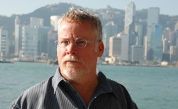|
 |
|
| |
Michael Connelly, A Rightful Heir by Maxim Jakubowski |
|
 |
| |
| autore |
| Michael Connelly |
 |
|
 |
Often, and rightly so, the Raymond Chandler Award has been given to a crime, mystery and thriller writer in recognition of his life’s work, rewarding his unmistakable talent and contribution to the genre, a reward for a glittering career. This year, however, it goes to an author who is still actively at the peak of his talent and who promises to keep on providing the readers and critics with many more masterpieces in the years to come. At 54, Michael Connelly is still young and eminently productive, having published at least a book a year for the past decade and more.
Not only is he a worthy Raymond Chandler Award winner, but I would say he is also today the rightful heir to Chandler, a writer who steps in the the very footsteps of the Chandler literary traditions, not only in the bruised nobility of his characters but also in the way he brings Los Angeles to life again and again in his gripping novels.
Michael Joseph Connelly was born in Philadelphia on July 21, 1956, and spent the first eleven years of his life there. His fascination for the world of crime began at an early age, through both his mother’s extensive library where he discovered Christie and Conan Doyle, but also as a witness to a shooting in his teen years, which had a profound influence on him. His family later moved to Fort Lauderdale in Florida where he spent the rest of his formative years before attending the University of Florida where he graduated in journalism. It was here that he was first introduced to the works of Raymond Chandler by his mentor, author Harry Crews, and knew that he wanted to become a novelist. Following university he became a reporter; unlike many journalists-turned-crime-writers, he thought that crime-beat reporting would be the best apprenticeship in the world of crime fiction and majored in journalism. His first jobs were as a beat reporter in Fort Lauderdale and Daytona Beach. In 1985, he covered the crash of Delta Flight 191, interviewing most of the survivors. A subsequent magazine article based on this coverage was nominated for a Pulitzer Prize, and soon after he was hired as a crime reporter by the Los Angeles Times. Many of his true life articles have since been reprinted in his Crime Beat collection.
He published his first novel The Black Echo in 1992, basing it on a murder that occurred the day after he arrived in Los Angeles. This introduced Hieronymus ‘Harry’ Bosch, Connelly’s major creation, an L.A. cop who is haunted by his Vietnam past, through which Connelly is able to portray much of the loneliness and despair of living in a violent, decadent and surrealistic Los Angeles that is in many ways an embodiment of the eponymous Dutch painter’s painting The Garden of Earthly Delights. Initially, the novel was planned as a one-off, but after it won the Mystery Writers of America Edgar award, Connelly was encouraged to continue with the character and leave journalism for full-time writing. Following The Black Ice (1993) and The Concrete Blonde (1994), Connelly felt the series would come to a conclusion with The Last Coyote (1995), at which point he wrote a stand alone thriller The Poet (1995). But the commercial success of the fourth Harry Bosch adventure was so overwhelming that he was encouraged to continue with the series, which now has reached 16 volumes.
The Poet was even more of a breakthrough, conjuring up a serial killer of unique chilling proportions, in which the involuntary hero is a journalist, Jack McEvoy who gets involved in a mysterious case alongside a crack FBI unit. McEvoy is possibly the closest character to Connelly’s heart, insofar as it allows him to examine the journalistic profession and its evolution in America, and the character returned in 2009 in The Scarecrow together with some of the conflicted and ambiguously-motivated law officers from the The Poet. But the McEvoy books are also masterful thrillers with labyrinthine plots which unfold at breakneck speed and hold the reader in a vice and represent Connelly at his best and most intuitive, and also at times, welcomely sentimental, in their depictions of couples hovering on the tightrope between duty and love.
Punctuating the Harry Bosch novels, Connelly who began harvesting almost every crime writing award in the USA and all over the world, also began introducing some new, distinctive characters to his universe. First came retired cop with a failing heart Terry McCaleb with Blood Work (1998), who also became the first Connelly character to make it to the cinema screen, as embodied by Clint Eastwood in the film of the same name he also directed, and sadly one of his lesser efforts. McCaleb was to appear in two further books before being killed off in The Narrows, where Harry Bosch himself avenged him posthumously.
Connelly’s other major character is lawyer Mickey Haller, who operates from his car in The Lincoln Lawyer (2005) and is eventually revealed to be Harry Bosch’s lost half-brother. In later titles, the two begin to cautiously collaborate on cases, which allows Connelly to examine certain cases from both the point of view of the police and the legal side, as in his latest novel The Reversal (2010). Despite their massive success Connelly’s books have yet to be adapted on a large scale by the movies, with repeated options (at one stage Harrison Ford was rumoured to be in line for the Harry Bosch part) and varied casting ideas mooted but never coming to fruition. The recent choice of Matthew McConnaughey as Mickey Haller is a recent development which appears as if it will be going soon into production and it is to be hoped this will open the floodgates of screen versions. Not that Connelly has been impervious to film, as in collaboration with his friend, crime writer and filmmaker Terrill Lankford, he has for several years now been producing mini-movies as high quality book trailers for every new novel which have been made available on his website and that of his US publishers.
Successive novels over the past years have begun deepening the ties between Connelly characters, with family ties, interaction and problems bringing various protagonists together in unusual ways, both in collaboration and occasionally in opposition. Both Bosch and Haller have children, ex-wives, girlfriends, messy family lives and this thread of reality increasingly provides Connelly’s books with an added source of realism the reader can identify with, beyond the impeccably-oiled plot mechanics. In addition, Los Angeles itself (as in Chandler) is a primary element in nearly all the books as Bosch, Haller and others navigate its mean streets, the contrast between its zones of haves and have-nots, its corruption, fascination and chequered history. Indeed, when asked about his influences, Connelly invariably mentions Chandler, with The Little Sister as a personal favourite, and cites Robert Altman’s version of The Long Goodbye which he saw in 1972, as a determining factor in his storytelling vocation.
One of the more fascinating aspects of the evolution of Michael Connelly’s writing as his career progresses and the success of the books provides him with a veritable carte blanche to write about any subject he wishes to is how increasingly social and political considerations permeate the books, from the excesses of US Homeland Security following 9/11 (The Overlook), the crumbling influence of newspapers determined by the spread of the Internet, the bureaucratisation of the Los Angeles Police Dept (Bosch even resigns his Post as a detective in City of Bones (2002) and functions, for the course of a few novels, as a private detective). In 9 Dragons, Bosch even travels to Hong Kong, where his daughter has been kidnapped, and has to face a different form of society in which his often John Wayne-like bull in a china shop attitudes are not seen in as favourable a light as they would be at home, and has to reconsider many of his principles.
One of the most common themes in Connelly’s writing is the warning issued by Nietzche: “He who fights against monsters should see to it that he does not become a monster in the process. And when you stare persistently into an abyss, the abyss also stares into you.” Dealing with society’s monsters, Connelly indicates, places one in great danger of becoming a monster. This is evident in Harry Bosch who, though not a monster, is an emotional train wreck and often fears he might have become what he is fighting.
Connelly is rightly praised for his complex plots, surprise endings and the clarity and power of his style, honed at his reporter’s desk. The amount of research he does is well-known and as a result his books have a distinctive ring of gritty truth from his years of experience as a reporter and additional research into forensics, technology, technology, autopsies, weapons, jazz performers or whatever else is required by his plots. Details, even the most minute, are meticulously accurate and provide the reader with an acute, heightened sense of reality, with the labyrinthine topography of the Los Angeles area particularly comprehensive and vivid. It might be said, such is the speed at which one is compelled to read a Michael Connelly thriller, regardless of which main character is at the helm, that the cleanliness of his style marks an absence of style. This is far from the truth indeed, and is the sign of ultimate craftsmanship and professionalism. A characteristic that is also one which is evident in Michael Connelly as a person: quiet but convivial, modest but knowledgeable, confident but always available; in fact, in all my encounters with him over the past 20 years, one of the nicest guys in crime fiction and somebody who has taken over the relay baton from Raymond Chandler as one of the greats of the crime and mystery field.
|
 |
|
|
|
|
 |
 |
 |
 |
 |
|



